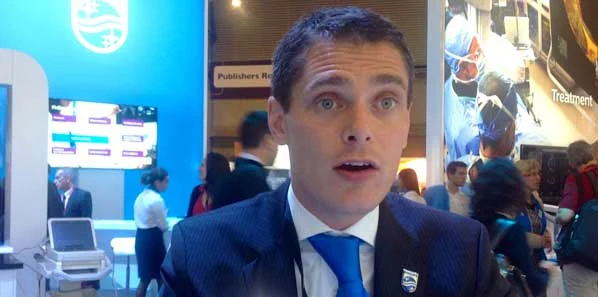Interview with Duncan Porter, Head of Field Marketing Philips
During the Affiniti product launch, you mentioned that Philips wants to play a role in the management of cardiology through leverage of Big Data. How can an equipment-driven company make such a bold statement?
There is an explosion of chronic diseases, which makes the current healthcare situation no longer sustainable. Healthcare providers are paying for increasing costs, and with the input of the accountable care act and the reduction in refund payments, companies are being called on to help manage this change. People are starting to take accountability for their own health and monitor their data. Terms like ‘safer wards’ and ‘meaningful alarms’ are emerging. The goal is to reduce ICU costs and bring down the time patients spend in hospitals. By providing smarter monitoring solutions, the patient gets to go home faster and improve his wellbeing faster.
Philips has a consumer lifestyle products heritage allowing it to impact prevention, diagnosis and treatment. This is the central backbone, providing a high level of connectivity throughout the company. By highlighting common threads and establishing benchmarking techniques, it becomes possible to identify improvements for laboratory and cardiology settings.
Within what timeframe will Philips increase its role, establishing itself in the Big Data world?
The future of healthcare is in Big Data. This is our core strategy and the meaningful innovation in our products sets us apart from our competitors. Our advantage in the future will come from providing direction in the use of data. There will be further announcements shortly, as we are strengthening our company by involving third party specialists, who are field experts in Cloud, Big Data and secure data transmission with regards to data use.
Where is your company advantage in the new ultrasound product Affiniti? What are the patient benefits in comparison to others?
Last year saw the launch of our 3D product Epic, which was revolutionary to ultrasound. Now we have brought this to a larger audience, making exams more reproducible, measurements simpler, and the operators’ job easier with less training thus allowing higher output. The data gathered by the modality produces premium image quality for a 2D system.
Some of your competitors claim that anything under 3D is no longer good enough.
I disagree. For 3D we have Epic, whereas our new Affiniti product is value-based healthcare, providing diagnosis as early on as possible.
What is your target market?
Diagnostic centres, shared service hospitals and any healthcare facility providing access to care, looking for a premium image quality modality with excellent value.
Meaningful innovation is important to involve stakeholders. How can this understanding be spread into personalised medicine?
The shift from clinical level to decision makers being held accountable from the product perspective has led to major innovation today. The future delivery of healthcare is in co-creation with partners like the ‘Karolinska Institute’ in Sweden. The public trusts Philips, and by utilising our combined knowledge, we are able to provide a perspective across the patient journey.
How does this contribute to personalised medicine?
The role of the cardiologist is changing. As various streams of data are coming together, such as from areas like imaging, these need to be analysed. The role of the data centre manager also changes, requiring input from other areas now.
Is Philips planning to take these data streams to analyse?
It is working towards seamless data integration.
Where do you see the main challenges in cardiology today?
Our customers tell us that they have reduced resources and higher patient numbers. They are required to do more with less, for patients that are more educated. Data on cardiologists is publicly available, making them less inclined to perform high-risk surgery. Staff retention is another issue. We want to establish centres of excellence to create the best possible patient outcomes with our partners. Training qualified cardiologists is not happening fast enough in some developing parts of the world. Governments and healthcare providers are turning to companies like Philips for assistance.
What importance do management and leadership have in the medical profession?
It is absolutely critical for the future and consultancy is becoming more important. Philips is helping to implement new processes, as vendors are changing from basic product supply to innovative product creation.
Duncan, thank you very much for this interview.
Latest Articles
Cardiology, Ultrasound, Philips, Innovation, ESC 2014, ESC Congress 2014, cardio
Interview with Duncan Porter, Head of Field Marketing Philips During the Affiniti product launch, you mentioned that Philips wants to play a role in the ma...









